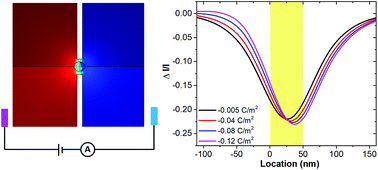Optimal voltage for nanoparticle detection with thin nanopores†
Abstract
The resistive-pulse technique provides a fast and label-free method for nanoparticle detection. To achieve higher sensitivity, thin nanopores such as silicon nitride nanopores are usually considered. In this study, nanoparticle detection has been mimicked with simulations. We found that the surface charges of particles can significantly affect current blockade in short pores, particularly under high electric fields. For particles with surface charge densities higher than −0.02 C m−2, current blockade ratios depend closely on the applied voltage. From our simulation results, an optimal voltage can be found for particle detection, at which the current blockade ratio does not depend on the surface charge density of the particle. This optimal voltage was obtained from the balance of current increase and decrease caused by cations and anions, respectively, due to negative surface charges of the particles. From this systematic study, the optimal voltage was found to represent a property of the system that only depends on the electrolyte type. We think our findings can provide some help for accurate particle detection in experiments.



 Please wait while we load your content...
Please wait while we load your content...